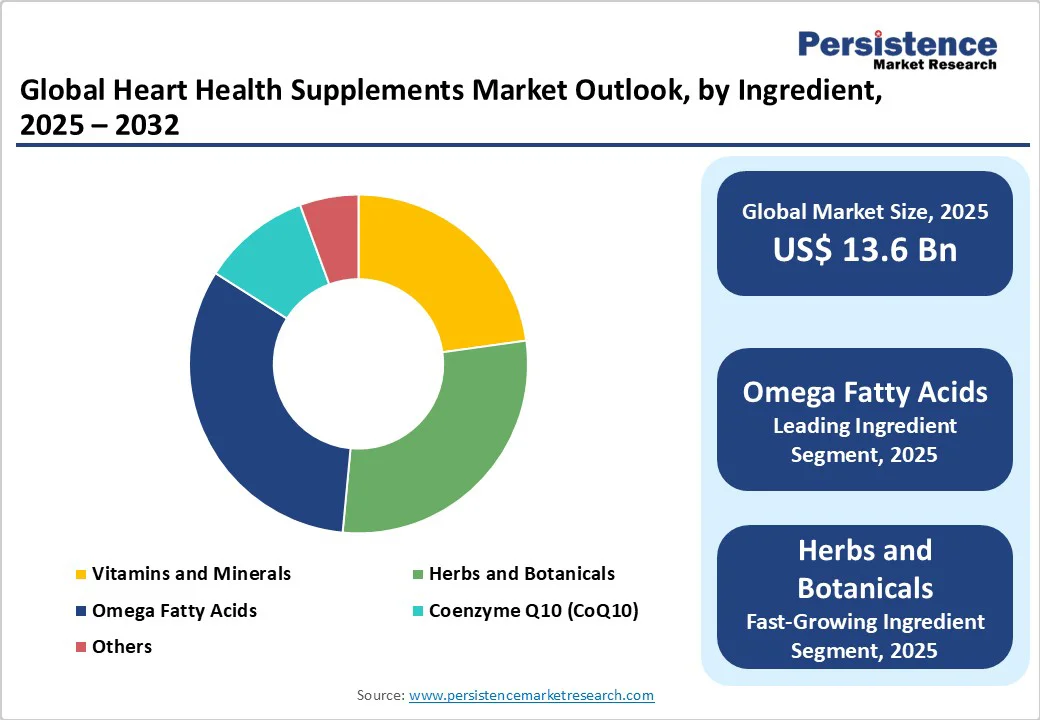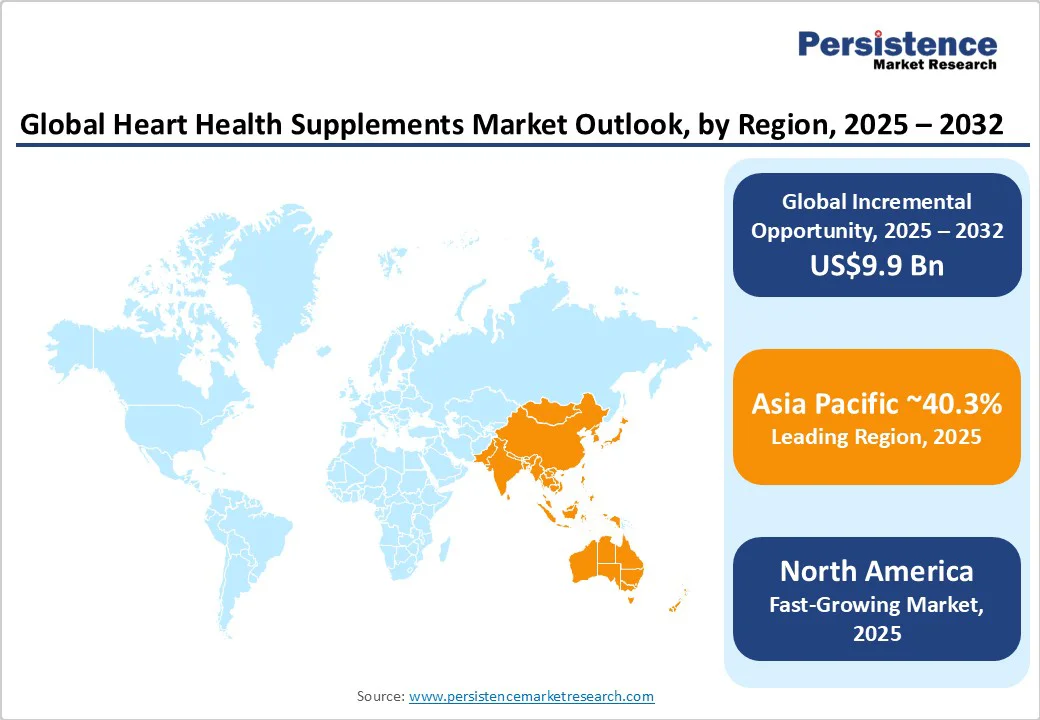ID: PMRREP5771| 186 Pages | 16 Oct 2025 | Format: PDF, Excel, PPT* | Food and Beverages

The heart health supplements market size is likely to be valued at US$ 13.6 Billion in 2025 and is estimated to reach US$ 23.5 Billion in 2032, growing at a CAGR of 8.1% during the forecast period 2025-2032. The heart health supplements market growth is being fueled by rising awareness of heart disease risks as well as increasing consumer trust in natural, plant-based, and clinically validated formulations.
| Key Insights | Details |
|---|---|
|
Heart Health Supplements Market Size (2025E) |
US$ 13.6 Billion |
|
Market Value Forecast (2032F) |
US$ 23.5 Billion |
|
Projected Growth (CAGR 2025 to 2032) |
8.1% |
|
Historical Market Growth (CAGR 2019 to 2024) |
7.2% |

A rising emphasis on preventive healthcare is driving the demand for heart health supplements. With cardiovascular diseases remaining the leading cause of death globally, consumers are proactively seeking nutrition-based solutions to support long-term heart wellness. A 2024 survey by the American Heart Association reported that over 60% of adults are now taking at least one supplement to maintain cardiovascular health.
This shift is especially visible among young demographics who are adopting preventive habits early due to rising sedentary lifestyles and stress-related disorders. Companies are capitalizing on this trend by developing daily-use heart formulations enriched with omega-3s, CoQ10, and antioxidants. The increasing popularity of wearable fitness trackers and health apps is also encouraging supplement consumption as part of broad preventive healthcare routines.
Consumers are now favoring natural, plant-based, and vegan heart supplements over synthetic alternatives due to increasing awareness of ingredient safety and sustainability. Plant sterols, polyphenols from green tea, and flavonoids derived from berries are gaining traction for their ability to support healthy cholesterol and blood pressure levels. Algae-based omega-3s have become a prominent innovation, providing EPA and DHA without relying on fish oil.
For instance, Natures Aid and Calgee have introduced vegan omega-3 capsules using microalgae sourced from sustainable farms. This clean-label movement is superior among millennials and flexitarian consumers who associate plant-based ingredients with better digestibility, fewer side effects, and environmental responsibility.
One of the key growth restraints for the market is the risk of negative interactions with prescribed cardiovascular drugs. Supplements such as omega-3s, CoQ10, and vitamin K can alter the effectiveness of medications, including statins, beta-blockers, or anticoagulants such as warfarin.
For example, high doses of omega-3 may increase bleeding risk when taken alongside blood thinners, while CoQ10 can reduce the efficacy of warfarin. Physicians often advise patients with heart conditions to avoid self-prescribing supplements, limiting market growth among older and chronically ill users. This interaction risk has led to greater scrutiny from healthcare professionals, making medical supervision a necessity before supplement use.
Another major restraint arises from the lack of strict regulatory oversight for dietary supplements. Unlike pharmaceuticals, heart health supplements are not pre-approved by the U.S. Food and Drug Administration (FDA), which means ingredient accuracy and dosage consistency can vary widely. Independent testing by ConsumerLab and other organizations has revealed that some over-the-counter supplements either contain lower active ingredient levels than stated or are adulterated with fillers and contaminants.
Such inconsistencies have reduced consumer confidence, mainly in regions where counterfeit or unverified products are widespread. The surging number of product recalls and warning letters from regulatory authorities has also made consumers more cautious, prompting them to prefer physician-prescribed or clinically validated alternatives instead.
The inclusion of omega-3 fatty acids such as EPA and DHA is creating new growth opportunities in the heart health supplements market. Consumers are becoming more aware of their role in reducing triglyceride levels, controlling blood pressure, and improving arterial elasticity. Brands are hence using algal-based omega-3s to cater to vegan consumers and address sustainability concerns.
For instance, Nordic Naturals and Opti3 have launched plant-based EPA and DHA capsules derived from microalgae, which provide comparable benefits to fish oil without the risk of ocean contaminants. Recent clinical studies also showcase that regular omega-3 intake lowers the risk of cardiac arrhythmias, prompting supplement manufacturers to fortify multivitamins and combination products with these fatty acids.
Creatine, traditionally linked to muscle and athletic performance, is now emerging as a promising compound for heart health. New research suggests that creatine supplementation in moderate doses can refine cardiac energy metabolism, reduce oxidative stress, and protect heart muscle tissues, especially in patients with chronic heart conditions. Studies from 2023 have shown its potential in improving cardiac output and reducing inflammation-related damage in heart cells.
This has led supplement brands to explore creatine as an add-on ingredient in heart health formulations rather than standalone sports products. Companies are anticipated to develop creatine-enriched heart care blends targeting older adults and individuals recovering from cardiac stress, marking a novel expansion beyond its conventional sports nutrition use.
Natural supplements are predicted to dominate with a share of around 71.8% in 2025 as consumers mainly associate them with safety, sustainability, and better compatibility with the body. Plant-based and herbal formulations are viewed as clean alternatives to chemical-based options, complying with the global trend toward natural wellness. In Asia Pacific and Europe, various heart health products now blend traditional medicinal herbs such as hawthorn, turmeric, and green tea extract with modern nutrients such as CoQ10 or omega-3s.
Despite the shift toward natural products, synthetic supplements continue to see steady growth due to their controlled composition, high bioavailability in some cases, and affordability. Multiple synthetic vitamins and minerals such as ascorbic acid (vitamin C) or folic acid provide consistent potency that natural sources cannot always guarantee. Pharmaceutical companies also favor synthetic versions for easy mass production and clinical testing.
Omega fatty acids are speculated to lead with a share of nearly 32.5% in 2025 due to their scientifically proven role in improving cardiovascular function and reducing inflammation. EPA and DHA, found in fish oil and algae, help lower triglyceride levels, stabilize heart rhythm, and improve endothelial function. Consumers are drawn to omega supplements backed by superior clinical evidence and official endorsements from global health bodies.
Herbs and botanicals are projected to see steady growth, backed by rising consumer trust in natural, traditional, and holistic remedies. Herbs such as hawthorn, garlic, turmeric, and green tea extract have long been used in Ayurveda and Traditional Chinese Medicine for supporting circulation, reducing cholesterol, and preventing plaque buildup in arteries. Modern brands are now validating these ingredients through clinical trials and standardized extraction processes.
Softgels are poised to account for approximately 38.4% of share in 2025 as they deliver superior absorption, easy swallowing, and better preservation of sensitive ingredients such as omega-3 fatty acids and CoQ10. Their oil-based composition allows fat-soluble nutrients to dissolve efficiently, leading to improved bioavailability compared to tablets or powders. Manufacturers also prefer softgels because they protect active ingredients from oxidation, ensuring product stability over time.
Capsules are likely to witness the fastest growth through 2032, spurred by their versatility, clean formulations, and compatibility with plant-based and allergen-free claims. Unlike softgels, which often use gelatin derived from animal sources, capsules can be made from hydroxypropyl methylcellulose (HPMC), making them suitable for vegetarians and vegans. This caters to the global shift toward cruelty-free and plant-based products.

Asia Pacific is estimated to account for approximately 40.3% of share in 2025 owing to rising cardiovascular concerns and increasing awareness of preventive health. Urbanization, changing diets, and rising stress levels have led to a high incidence of heart-related issues, encouraging consumers to adopt supplements rich in omega-3, CoQ10, and plant sterols. A 2025 Herbalife survey revealed that around 80% of consumers in Asia Pacific now use supplements regularly, with most associating them with long-term heart and immune health.
Young consumers are particularly proactive, integrating supplements into fitness and wellness routines, while the elderly population uses them to manage age-related cardiac risks. Several consumers in India, China, and Japan favor supplements inspired by Ayurveda or Traditional Chinese Medicine, incorporating ingredients such as hawthorn, garlic extract, and red yeast rice. However, quality and safety concerns have occasionally affected market trust, as seen in the 2024 Kobayashi Pharmaceutical red yeast rice scandal in Japan, which led to multiple product recalls.
North America’s market is witnessing considerable growth, supported by an aging population, increased awareness of cardiovascular diseases, and a surging preference for preventive healthcare. Consumers are now seeking supplements that support heart health, leading to a rise in the availability and variety of such products. This trend is further fueled by developments in supplement formulations and delivery methods, improving the efficacy and appeal of heart health supplements.
A key trend in the regional market is the shift toward natural supplements. In 2024, natural supplements accounted for a substantial share of the market in North America. This preference caters to consumer demand for clean-label products and a rising inclination toward plant-based and organic ingredients. The popularity of natural supplements is also influenced by concerns over the potential side effects of synthetic alternatives and a desire for products perceived as safer and more aligned with holistic health practices.
In Europe, Germany stands out for its well-established pharmaceutical and nutraceutical industry, significantly contributing to the increased consumption of heart health supplements. The country's emphasis on research and development, coupled with a focus on quality, has led to the production of premium cardiovascular health supplements. Natural supplements are mainly popular, catering to the surging consumer preference for plant-based and organic products.
The U.K. holds the largest revenue share in Europe's nutrition and supplements market, pushed by high consumer demand for health and wellness products. This demand is fueled by an increasing focus on preventive healthcare and a surging awareness of the benefits of dietary supplements. The U.K. is also characterized by a high level of e-commerce adoption, with more consumers opting for the convenience of online shopping for supplements.

The heart health supplements market is dominated by well-established nutrition and wellness brands such as Amway, Nature Made, Herbalife, and NOW Foods, alongside new players, including HUM Nutrition and Care/of, that focus on personalization and clean-label products. Big consumer health firms such as Nestlé Health Science and Pharmavite are expanding their portfolios with clinically backed ingredients, embracing superior retail distribution and brand trust. Meanwhile, small-scale brands compete through innovation, vegan formulations, and targeted marketing via e-commerce platforms.
Key players in the cardiovascular health supplements market are differentiating themselves by promoting clinically proven formulations with improved absorption or purity. For example, Nordic Naturals and Carlson Labs have gained popularity for their sustainably sourced omega-3s with high EPA and DHA content, while Kaneka’s ubiquinol-based CoQ10 is being used by multiple brands due to its superior bioavailability.
The heart health supplements market is projected to reach US$ 13.6 Billion in 2025.
Rising awareness of cardiovascular health and increased focus on preventive care are the key market drivers.
The heart health supplements market is poised to witness a CAGR of 8.1% from 2025 to 2032.
Incorporation of clinically backed botanicals and innovation in softgels are the key market opportunities.
Bright Lifecare Pvt Ltd (Truebasics.com), NOW Health Group, Inc., and Natural Organics, Inc. are a few key market players.
| Report Attribute | Details |
|---|---|
|
Historical Data/Actuals |
2019 - 2024 |
|
Forecast Period |
2025 - 2032 |
|
Market Analysis |
Value: US$ Bn/Mn, Volume: As Applicable |
|
Geographical Coverage |
|
|
Segmental Coverage |
|
|
Competitive Analysis |
|
|
Report Highlights |
|
By Product Type
By Ingredient
By Form
By Distribution Channel
By Region
Delivery Timelines
For more information on this report and its delivery timelines please get in touch with our sales team.
About Author